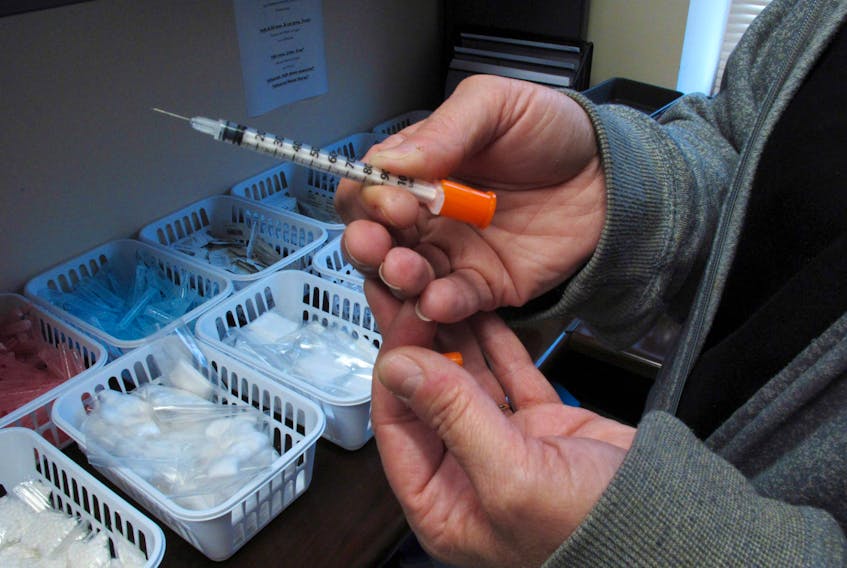MOUNT THOM N.S. - It's a cold and wet day when Karen Kittilsen Levine packs up and heads over Mount Thom to Pictou County.
In her vehicle are needles, water, alcohol swabs and condoms. For most people, it is not your typical collection of supplies for a road trip, but for Levine it is something she packs each week as drives across Northern Nova Scotia to help people who are finding it difficult to help themselves.
As program co-ordinator for Northern Healthy Connections Society, Levine visits Pictou County to distribute new supplies to people with drug addictions.
The society started out with a fixed site in Truro in 2010 where it distributed a limited number of harm reduction materials through the Mainland Needle Exchange, but this changed in 2015 when the province decided to adopt a more proactive approach to the opioid crisis occurring across Canada.
The province has established four zones that include the work of non-profit organizations such as Northern Healthy Connections Society, which each receive funding from the Nova Scotia Health Authority to support their program needs.
“The government is being very proactive in getting a head of it,” she said. “It has developed the opioid use and overdose framework and harm reduction is the place where we come in.”
In its mandate, the provincial government has recognized that the demands on community organizations such as Northern Healthy Connections Society is high and funding was limited. Its first step was to stabilize funding and it will also be reviewing the current needle distribution and disposal services model. Other areas it will focus on will be prevention, treatment and prescribing practices as well as criminal justice and enforcement.
As the government continues its work, Levine and co-workers focus on theirs by making sure that people in Northern Nova Scotia are reducing their risks for contracting other infections and diseases.
“Transmissions can happen for hepatitis C and HIV,” she said, adding that condoms are also part of their standard supplies in hopes of reducing the numbers of people with sexually transmitted infection.
“Sometimes if you are under the influence, you may not always be making the right choice in terms of sexual behaviour,” she said. Currently, chlamydia is the most reported STI in the province. The highest rate in 2016 was reported among females ages 15 to 24 but there was an increase in cases for males ages 25 to 39.
According to Notifiable Diseases in Nova Scotia 2016 Surveillance Report, Northern Nova Scotia, which includes Pictou, Colchester and Cumberland counties, has the second highest rate of hepatitis C.
Levine said both of these statistics are concerning, but she believes that providing people in need with clean supplies is key to reducing the numbers in the future.
So far, based on the society’s own numbers, it seems to be making a connection.
Currently, in Northern Nova Scotia, the society says 86 per cent of its clients use opiates. The society has distributed 95,324 needles in the past year in the northern zone and of those needles distributed, 41,640 (43 per cent) were in Pictou County.
On the flip side, 120,193 needles were returned in the Northern region in the past year and 74,640 (64 per cent) came from Pictou County.
Its client interactions in Northern Nova Scotia have increased substantially which also plays a key role in harm reduction, she said. From 2015/16 to 2017/18, its client visits went from 200 to 950.
“There are more people coming forward because they know we are here,” Levine said. “In Truro, we provide a very relaxed and non-judgmental atmosphere. We invite people to have a cup of tea, a bottle of water and to get their supplies. We have that opportunity to talk to people and ask them how they are doing. It's a check-in.”
It is also a place for people to talk about issues they are facing such as upcoming court dates where they could use some emotional support or help with community services, she said.
Reaching clients in Pictou County is a bit more of a challenge because there is no fixed site here yet. It is her dream one day to see a fixed site in the area but until that happens, the society is doing its best to let people know it is here.
“We make contacts with people. We are making connections and we put out posters and brochures. We try to get the word of mouth going by saying ‘Do you know someone else that needs our services?’ It is going to take a little time, but our client list has increased every single trip out. It means word is spreading.”
She said family members concerned about loved ones can also contact the society and learn more about its services.
Levine knows there are people who feel the work she does is not helping the opioid crisis or people with addictions, but she said she knows, if she had a loved one in need, she would want them to be as safe as possible.
“If there were anyone I knew that had an addiction or was a person using drugs, I would be so appreciative they had these supplies so they can be protected from any more harm.”
Its value can also be looked at from a health care point of view.
“It is very expensive to treat someone in the health care system with hepatitis C,” she said. “It can cost $80,000 for a course of treatment for hepatitis C for one person. To provide clean supplies to one person is $10 a day. One of the highest rates of transmission of hepatitis C is through intravenous drug use and then unsafe sexual behaviours.”
More information about Northern Health Connections Society can be found at www.nhcsociety.ca or by calling 902-895-093









